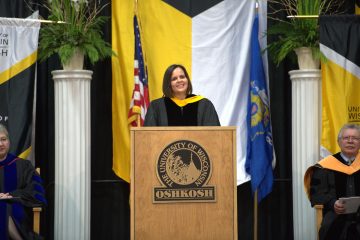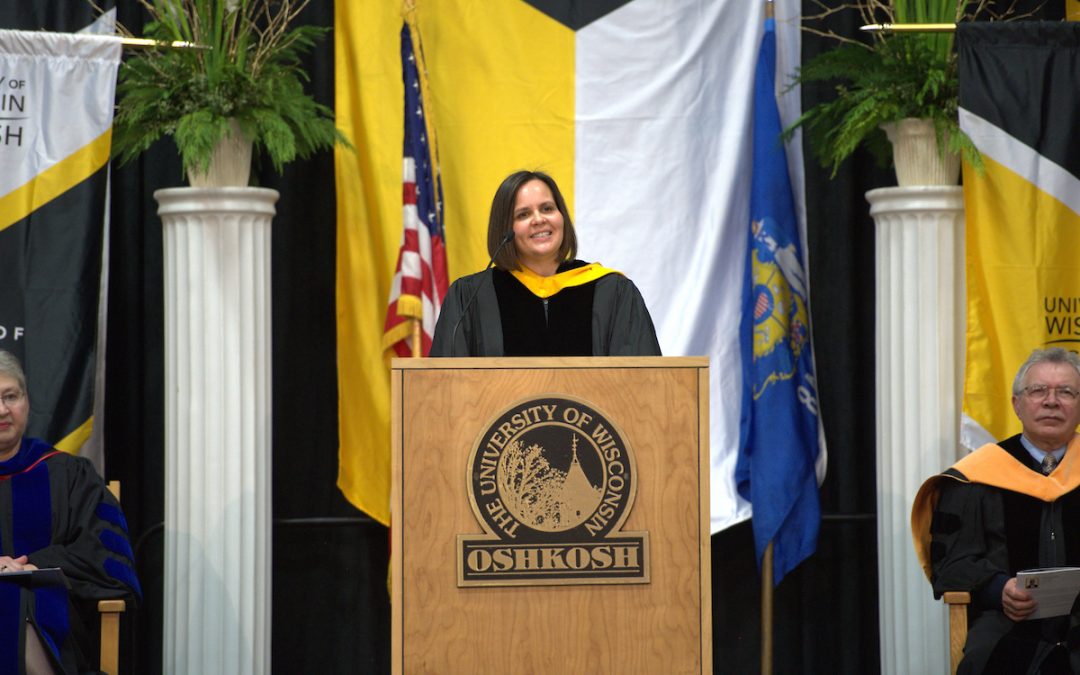 The following is the text of the full University of Wisconsin Oshkosh of the Dec. 16 commencement speech delivered by faculty member Jennifer Considine from the College of Letters and Science.
The following is the text of the full University of Wisconsin Oshkosh of the Dec. 16 commencement speech delivered by faculty member Jennifer Considine from the College of Letters and Science.
“Thank you Provost Koker. Congratulations graduates! I am honored to be here with you today to share one last teachable moment.
“I come before you today with one request –I ask you to listen. I ask you to listen to your own voice. I ask you to listen in your relationships. I ask you to listen in your community. I understand this is not a simple request.
“As a faculty member in the Department of Communication, my job is to teach students how to be effective communicators. In my 10 years at UW Oshkosh, I have had the privilege of listening to thousands of students’ speeches. And for me, it has truly been a privilege.
“Now, I understand that giving those speeches hasn’t always felt like a privilege for you. For many of you, thinking back to your college speeches and presentations brings back late nights trying to figure out what to say, mornings with too much coffee and nervous energy, fears that your will pass out, and worries that no one will listen to you. But for me, when I think back to your speeches, I am honored to have been able to listen.
“In listening to these speeches, I have learned so much. I have learned about your plans to be teachers, nurses, scientists, entrepreneurs, international travelers, social justice advocates, writers and artists. I have learned you want to have real conversations about real issues and you want these conversations to lead to real change. I have learned about your struggles with anxiety and your belief that we need greater mental healthcare. I have learned about your commitments to sustainability and your plans for addressing climate change. I have learned about your encounters with discrimination and your plans for building a more inclusive world. What I have learned most of all is that each of my students enter the classroom with a distinct set of joys and fears, strengths and challenges, dreams and goals. But what all my students have shared is a desire to speak their truth and have someone truly, deeply listen.
“We spend a lot of time in our society talking about our right to free speech. And this talk is important, our right to free speech matters. But speech alone is not effective communication. To have truly effective communication, we need both speaking and listening. And recent survey results suggest that perhaps we are not doing a great job of both. The number of U.S. American adults that feel lonely has more than doubled in the last 25 years. In our workplaces, we feel disconnected from our work and our coworkers. In our communities, we hear more about what divides us than brings us together. It seems we are forgetting how to listen to one another.
“Why is it so hard to listen? For one reason, there is simply too much to listen to these days. We have Spotify, Pandora, Netflix, Hulu, Twitter, Facebook, and Snapchat. We have parents, children, bosses, teachers, students, friends and roommates. We want to share a quiet moment with a family member or friend, but our phones keep ringing or beeping or singing or chirping or playing the Star Wars theme or whatever your phone does to tell you that yet another message has arrived. We are surrounded every day by thousands of messages vying to get our attention, to tell us who we should be and what we should do.
“Why is it so hard to listen? We live in a time of great diversity, but also great division. We often have a hard time setting aside our own experiences, our own biases, to listen deeply to the truths of others. We have a hard time believing that others will actually listen to us and not just respond by preaching their own truth.
“It is precisely these challenges that call us to make a dedicated effort to listen. To listen deeply for our own truths and listen deeply to the truths of others. If we are to find ways to live together in community, to solve the problems that we have inherited, to create a more just, free and equitable world, we must listen.
“We must begin by listening to ourselves. Graduates, in the busy weeks and months to come as you transition to the next step of your life, I ask you to make time to listen. Give yourself a few moments away to celebrate what you have achieved by graduating. Give yourself a few minutes every day to hear your dreams. Hear your fears. Hear your joys. Know that you are worthy of being listened to.
“We must also listen deeply to the truth of others. Call the friend or family member that you haven’t talked to in the last few weeks as you tried to survive the onslaught of final papers and exams. Notice the person around you that seems lonely, isolated, or alone, and ask them about their dreams, their goals, their experiences. The next time, you ask ‘how are you,’ listen carefully for the answer.
“When we start listening, there are some voices that we can’t help but hear. Voices that speak loudly and clearly and have a platform. We need to listen to those voices.
There are also voices that are hard to hear. Voices that have historically not been welcomed in our society. Voices that have not been given a platform. We need to listen for those voices. And when we don’t hear them, we need to listen harder.
“Graduates, I ask you today to put yourselves in places where you can listen to people whose experiences are different from your own. When you make decisions in your businesses, your classrooms, your hospitals, your nonprofits, make sure you are listening to everyone’s voices, the loud and the quiet.
“And remember, listening doesn’t require us to simply hear the voice of another. Listening calls us to engage, to ask questions and provide feedback. We won’t always agree with everything we are listening to and that’s okay. Communication is often messy. Community is messy. We won’t do it perfectly, but we must do it. We must listen. It is in our listening that we will build the connections that enable us to create an inclusive community.
“In closing, I have one final request of you. When you have truly, deeply listened, respond. Speak what you have learned. Speak what you know to be true. Speak about your joys. Speak about your fears. Speak about the changes needed in your community. Speak up. We are here and we will listen. Thank you.”
Learn more:

